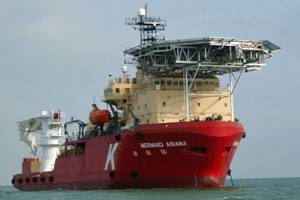Singapores ASL Builds Big and Complex
The application of diesel electric technology gives a remarkable flexibility to vessels in the larger offshore market. In November Singapores ASL Shipyard completed work on the 295-ft by 72-ft diving support vessel Mermaid Asiana. Destined for service in Mermaids extensive Thai fleet, the DP2 classed vessel has redundancies well beyond the basics.
With three Kawasaki bow thrusters the vessel could maintain DP2 status even if one thruster was down. This is but one example of the importance placed on maintaining position, as the ships primary function is to support and maintain the safety of divers working at maximum depth. Divers for situation diving descend up to 300 meters in a 6.3-cubic meter diving bell that is lowered through a mid-ship moon pool. After working a shift at depth they are brought up in the pressurized bell that is then attached via an air lock to one of two large accommodation pressure chambers. The chambers are equipped with bunks and other amenities to support up to 12 divers at pressure between dives. A third small decompression chamber is provided for bringing divers back to surface pressures when the job is completed.
With three bow thrusters, two Niigata azimuthing propulsion drives and massive electrical requirements for everything from cranes to accommodation, the need for flexibility and redundancy in the power supply is important. To meet these requirements, the vessel has six 1900 kW Cummins QSK60 (D) powered generators each capable of delivering 1600 kW into the main buss. In reality all electrical requirements can be met with only five generators so that one is always on standby. An additional Cummins KTA38-powered emergency genset is installed on a higher deck level.
In addition to the diving capabilities, the vessel is also fitted out and equipped for ROV support. On the after deck there is a 100-ton knuckle boom crane as well as a ten-ton auxiliary and a two-ton stores crane. Accommodation for up to 100 workers and crew is provided in a range of one, two and four-berth cabins. A helipad is mounted forward rated for a Sikorsky S-61 N, Super Puma.

















